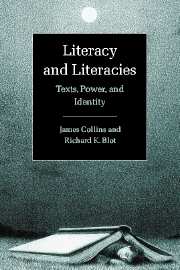Book contents
- Frontmatter
- Contents
- List of figures
- Foreword by Brian V. Street
- Preface
- Acknowledgments
- 1 Introduction: texts, power, and identity
- 2 The literacy thesis: vexed questions of rationality, development, and self
- 3 Situated approaches to the literacy debate
- 4 Literacies and power in modern nation states: Euro-American lessons
- 5 Literacies and identity formation: American cases
- 6 Literacy, power, and identity: colonial legacies and indigenous transformations
- 7 Conclusion: literacy lessons – beginnings, ends, and implications
- Notes
- References
- Index
- Studies in the Social and Cultural Foundations of Language
5 - Literacies and identity formation: American cases
Published online by Cambridge University Press: 22 September 2009
- Frontmatter
- Contents
- List of figures
- Foreword by Brian V. Street
- Preface
- Acknowledgments
- 1 Introduction: texts, power, and identity
- 2 The literacy thesis: vexed questions of rationality, development, and self
- 3 Situated approaches to the literacy debate
- 4 Literacies and power in modern nation states: Euro-American lessons
- 5 Literacies and identity formation: American cases
- 6 Literacy, power, and identity: colonial legacies and indigenous transformations
- 7 Conclusion: literacy lessons – beginnings, ends, and implications
- Notes
- References
- Index
- Studies in the Social and Cultural Foundations of Language
Summary
Beyond the origins that have assigned to us biological identity papers and a linguistic, religious, social, political, historical place, the freedom of contemporary individuals may be gauged according to their ability to choose their membership, while the democratic capability of a nation and social group is revealed by the right it affords individuals to exercise that choice.
(Kristeva, 1993, p. 16)A dominant culture does not define itself in the first place by what it renounces, whereas the dominated are always concerned with what the dominant refuses them, whatever is their attitude: resignation, denial, contestation, imitation, or repression.
(Jean-Claude Passeron, cited in Chartier, 1995, p. 96)Introduction
What we have called the mature national period ends in the 1960s and 1970s in the context of cultural and political upheavals and the onset of a substantial reworking of economic institutions and practices. A lively critique of schooling and literacy also emerged during this period of transition, and it can be understood as part of the “legacy of the sixties.” That is, it was part of the political and intellectual upheaval that called into question American imperial power, the meritocractic vision of the nation state, and core features of the national culture, including the pervasiveness of standardized consumer culture and large-scale bureaucracy. The cultural and political revolts of the sixties were not simply national but international in scope, occurring in Paris and Prague as well as Chicago, in Mexico City and Tokyo as well as San Francisco.
- Type
- Chapter
- Information
- Literacy and LiteraciesTexts, Power, and Identity, pp. 99 - 120Publisher: Cambridge University PressPrint publication year: 2003



